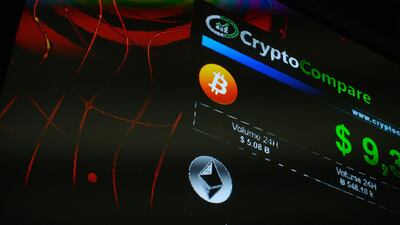Blockchain, fintech and other sweeping digital advances are set to transform global trade over the next decade, according to a new report by Dubai’s DMCC.
The research, entitled "The Future of Trade", also explores how geopolitical factors, such as China's emergence as the new champion of globalisation, will impact trade in the coming years.
Overseen by DMCC, the biggest free zone in the world in terms of concentration of businesses, the report launched on Tuesday in London, brings together the collective thinking of 250 global industry leaders, academics and experts in six commodity trade hubs - Dubai, London, Zurich, Singapore, Johannesburg and Hong Kong - over a period of 12 months.
Among its key findings is that technology can bridge a $1.5 trillion trade finance gap, and open up new opportunities for trade across borders. This will be driven, in large part, by the adoption of blockchain, the technology that underpins cryptocurrencies such as bitcoin. Blockchain, supported by fintech, is widely seen as the big disruptor and enabler for trade finance.
_______________
Read more:
HSBC performs first trade finance transaction with blockchain
Facebook shakes up its management and launches a blockchain division
Dubai closes gap with competitive economies
_______________
At present, roughly half of small and medium-sized enterprises (SMEs) funding applications are rejected by banks. This has resulted in a $1.5tn gap in trade finance.
However, alternative trade finance solutions are also becoming accessible to a much larger extent than in the past. Blockchain will play a key part in helping to bridge the trade finance gap in the next decade, the report notes, as digital trade finance becomes a sought-after alternative among SMEs.
Blockchain is ripe for adoption. It will provide faster, more secure and effective ways to handle workflows in order to move goods across international borders. According to the report, blockchain could also potentially help cut by up to 20 per cent of paperwork costs related to global trade, currently estimated at $1.8tn.
Supply chain improvements, such as the cost and time savings associated with blockchain, could increase global gross domestic product by almost 5 per cent, and trade volumes by 15 per cent.
At the same time, global trade is undergoing radical change as a result of geopolitical factors. From Brexit in the UK, to China’s Belt-and-Road mega project, through to an increasingly protectionist United States.
Asia is taking its place on the world stage and the world’s economic centre of gravity is shifting towards this region, the report notes. Within Asia, China is seen as the emerging champion of globalisation, with its Belt-and-Road initiative aiming to connect markets across Asia, the Middle East, Africa and Europe.
But while China has often been seen as “the factory of the world”, new manufacturing hubs are also emerging.
As China’s economy becomes more reliant on domestic consumption and technologically-led manufacturing, the report predicts that around 100 million labour-intensive manufacturing jobs will move to other low-cost countries. This trend could see Africa become the next major manufacturing hub, the report argues.
Trade wars have been dominating the headlines in recent months, and the report cites Bloomberg estimates which put the cost of a full-blown trade war at $470bn.
However, participants in the report also struck a balanced tone, arguing that tariffs and other protectionist measures are valid short-term tools to pursue national interests.
“While trade wars will always be a matter of life, largely, the protectionist agenda is seen as a short term trend to save jobs, based against a national security rationale, and for short-term political gain,” the report participants wrote.
Looking at trade in primary goods, the research introduced a Commodities Trade Index which ranked leading commodities trading hubs.
The UAE ranked as the number one global hub for commodity trade in 2018, thanks to a high score in nature resource endowments, while the US and Britain came second and third respectively, scoring highly among the institutional factors.
The report also looked at the future of sustainability in trade, a key topic given the decline of natural resources and the rise of social responsibility.
Here again, digital technologies such as blockchain and cloud-based warehouse management systems will play a critical role in helping to make the supply chain accurate, while reducing costs.
Increase in consumer demand for green products – driven by the most rapid expansion of the middle class the world has ever seen – will see a huge rise in demand for sustainable packaging, with the market forecast to reach $203bn by 2021, according to the report.

